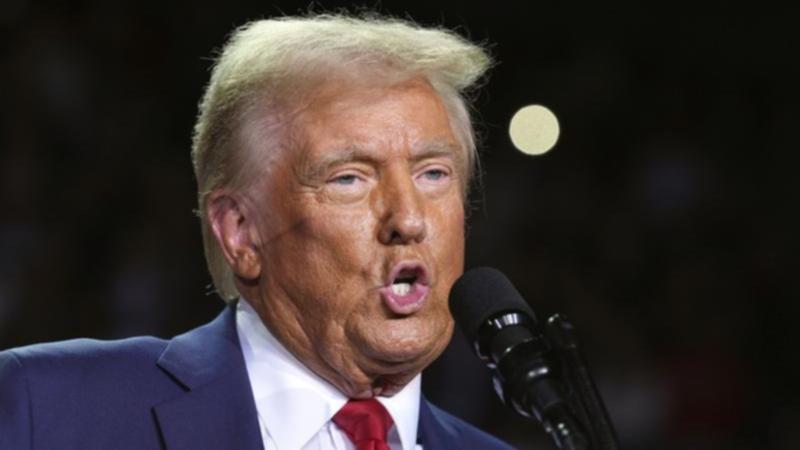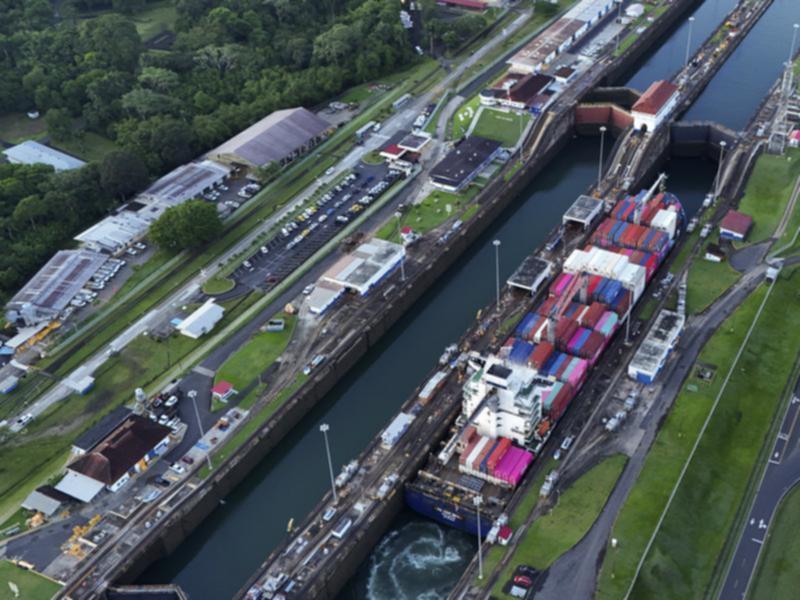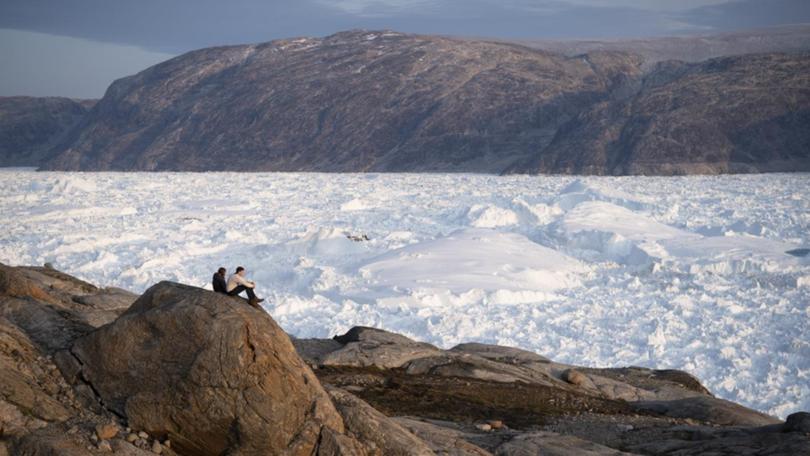THE ECONOMIST: Donald Trump eyes global real estate takeovers for ‘national security’
More than a century after Americans completed the Panama Canal, and 25 years after the US gave it to Panama, Donald Trump, the president-elect, says he wants it back.

At Miraflores locks trains guide a ship through the water as a gaggle of tourists looks on.
More than a century after American engineers completed the Panama Canal, and 25 years after the United States handed it over to Panama, Donald Trump, the president-elect, says he wants it back.
The canal, he says, was a “gift” that should never have been given.
Sign up to The Nightly's newsletters.
Get the first look at the digital newspaper, curated daily stories and breaking headlines delivered to your inbox.
By continuing you agree to our Terms and Privacy Policy.Cargoes to or from the United States dominate traffic on the canal. But it has been transformed since the handover. The legacy locks now account for just half of the goods by weight that pass between the Atlantic and Pacific oceans every day.
Instead Neopanamax vessels up to 370 metres long pass through a new, larger set of locks. Liquefied natural gas cargoes can make the trip from Texas and Louisiana to Asia in under a month.
The canal’s upgrade was paid for by the Panamanian government and finished in 2016 at a cost of $US5.2bn.
Panama is part of a bigger piece of real estate that Mr Trump has his eye on. He wants to influence territory and infrastructure close to the United States. He views Mexico as a source of unwanted migration, drugs and Chinese goods, Canada as a liberal dystopia and Greenland as a weak link.

Some of his remarks are bluster. The Gulf of Mexico, he says, should be renamed the Gulf of America.
Marjorie Taylor Greene, a congresswoman, has drawn up legislation for that purpose; Mexico’s leader Claudia Sheinbaum has retorted that a portion of the continent should be renamed Mexican America.
He says Canada should become the 51st member of the United States, but among just a few other problems with that, absorbing relatively liberal Canada into the United States would dilute the Republicans’ political clout.
Yet his remarks about the Panama Canal, Greenland and Mexico touch on real sensitivities and have tangible consequences.
On January 7th Mr Trump said the canal was “vital to our country” and claimed that it is being “operated by China”. On January 9th Dusty Johnson, a Republican congressman, proposed a bill to authorise the purchase of the canal from the Panamanian government, citing “China’s interest in and presence around the canal”. José Raúl Mulino, Panama’s president, has responded to Mr Trump’s by saying that “every square metre of the canal” belongs to Panama and will continue to do so.
MAGA claims that China operates or owns the canal are false. Nonetheless the Panamanian government has become cosy with China in recent years.
“China doesn’t have control of the canal, but it has taken advantage of weak institutions and endemic corruption to increase its influence in national politics and business,” says Alonso Illueca of Santa María La Antigua Catholic University in Panama city.
In June 2017 Panama’s government ended diplomatic relations with Taiwan and established them with Beijing. The United States’ ambassador to Panama found out an hour before the switch. Chinese firms had already won contracts to build a port, a power plant and a convention centre, but activity increased after the diplomatic realignment.
Panamanian politicians have enjoyed junkets to China. Xi Jinping, its president, visited Panama in 2019. The construction of a Chinese embassy near the mouth of the canal was scuppered thanks only to intense pressure from the United States.
American attempts to regain commercial influence have flopped: Bechtel, an American firm, bid to participate in the canal expansion project but didn’t win. When a port concession held by a Hong Kong firm came up for renewal in 2021, Panama’s government resisted calls to open the tender and renewed the contract.
Mute in Nuuk
Mr Trump also says “the United States of America feels that the ownership and control of Greenland is an absolute necessity” for “purposes of national security”.
He has refused to rule out using force.
Mute Egede, Greenland’s prime minister, says its 57,000 residents do not want to be either Americans or part of Denmark, as they are at present.
Mr Trump’s allies point to China’s “Polar Silk Road”, a spree of infrastructure-building in the Arctic, as a threat, but that is old news. The cash-strapped Greenland government did welcome Chinese investment a decade ago, but pressure from the Danish and American governments often blocked Chinese projects.
Chinese mines have faced financial obstacles and local opposition. China’s activity is now mostly confined to fisheries. A poll in 2024 showed that 25 per cent of Greenlanders welcome more co-operation with China, down from 47 per cent in 2021.
But it is undeniable that Greenland is important to America’s national security.
The shortest route for Russian nuclear missiles to reach America’s east coast goes right over the island: Pituffik Space Base in the territory’s north-west hosts part of America’s missile early-warning system.
The so-called Greenland-Iceland-United Kingdom gap plays a central role in the high-stakes submarine contest between Nato and Russia.

“Frankly, this is our backyard … Actually, it’s our front door,” says Tom Dans, a former Trump appointee at the US Arctic Research Commission.
A majority of Greenlanders want independence from Denmark.
Under a 2009 home-rule law they have a roadmap to achieving it, though they remain divided on timing and economic viability. An independent Greenland could be vulnerable to coercion and be an unreliable ally.
Greenlanders can have a Panglossian view of geopolitics. The government has advocated non-militarisation. In 2024 2 per cent of Greenlanders considered growing military tension their biggest challenge.
What next?
As usual with Mr Trump’s wildest pronouncements, deals are much more likely than extreme outcomes. Greenland becoming part of the United States would do little to improve security. Yet a military and economic reset is looming.
Denmark announced an Arctic military package worth $US2bn in December. The Danes are buying more anti-submarine warfare kits, surveillance drones and ships, and plan to upgrade a civilian airport to handle F-35 fighter jets flown by Denmark and the United States.
In Nuuk on January 13th Mr Egede said he had been “shocked” by Mr Trump’s comments, yet at the same time signalled closer co-operation on defence, and welcomed American investment in mining.
“The US doesn’t need to own Greenland in order to support its presence there,” says Kristine Berzina of the German Marshall Fund, a think-tank.
Likewise an American invasion of Panama is not on the cards.
Mr Mulino has rejected any negotiation over the canal, which brings in $US5bn in annual revenue. Yet it seems likely that Panama will try to deepen commercial and diplomatic links with the United States, and to reduce its China connection.
America’s most important immediate neighbour sets an example here.
On January 13th Ms Sheinbaum announced a new “Plan Mexico” aimed at reducing its dependence on inputs from China, and reaffirmed the centrality of the usmca trade deal linking the United States, Mexico and Canada.
Will it be enough to placate Mr Trump? She also revealed that she had not been invited to the president-elect’s inauguration.
Mr Trump is not about to invade his neighbours. But he is unlikely to prioritise building reliable partnerships either. The new doctrine is one of deference.
